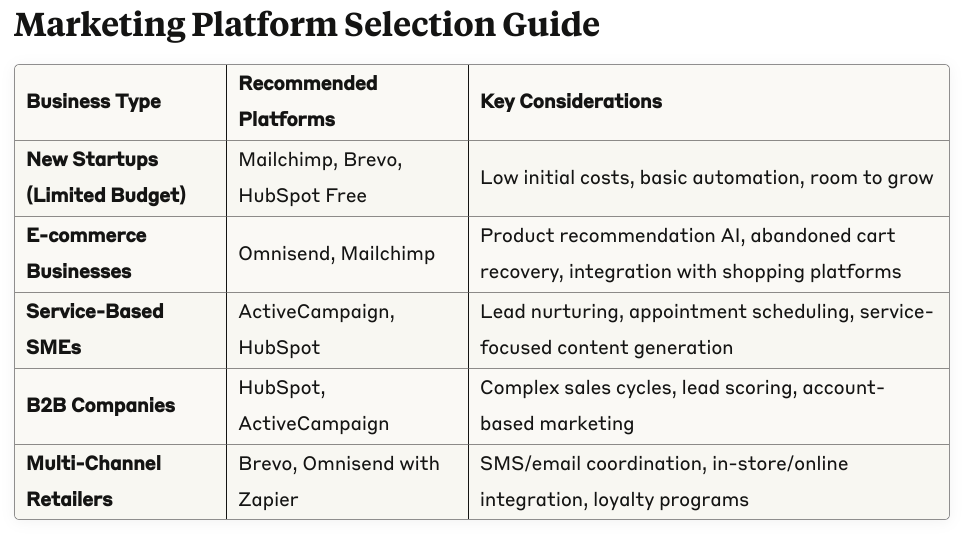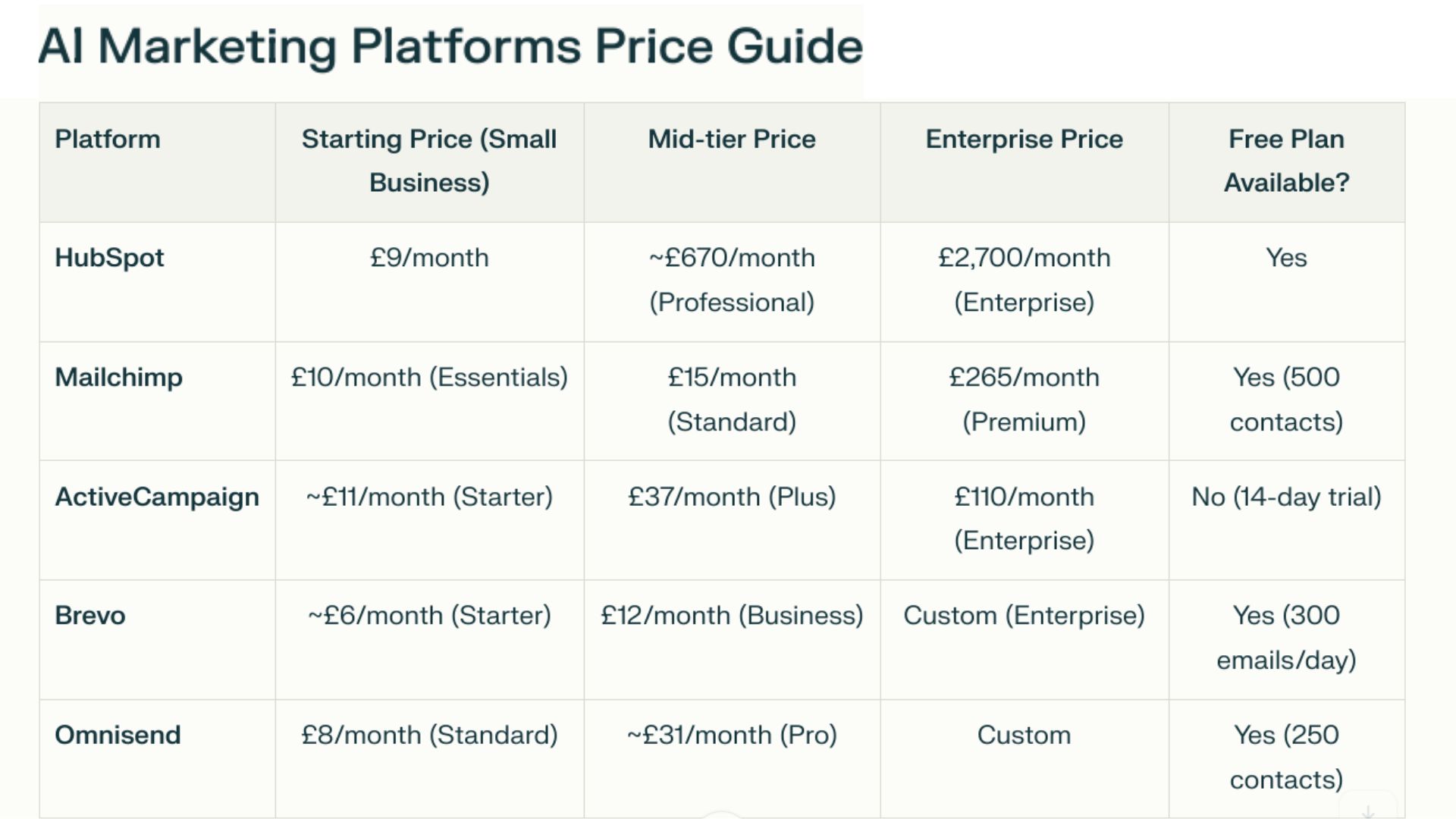UK small businesses can now access AI marketing tools that deliver enterprise-level personalization previously unattainable. HubSpot users report 129% more leads and 36% more closed deals after one year. Platforms like Mailchimp offer GDPR-compliant frameworks essential for UK businesses. Choose between comprehensive solutions or specialized tools based on your tech stack and growth plans.
Catch another post about AI integration here: https://amzoraltd.com/the-role-of-artificial-intelligence-in-future-proofing-your-online-presence/
AI Marketing Automation Tools for UK Small
Business Solutions
Key Takeaways
- AI marketing automation tools have moved beyond simple rule-based systems to offer UK small businesses enterprise-level personalization and efficiency capabilities previously unattainable.
- UK businesses using AI marketing solutions see concrete results, with HubSpot customers reporting 129% more leads and 36% more closed deals after just one year.
- GDPR compliance is non-negotiable for UK businesses, with platforms like HubSpot and Mailchimp offering robust UK-specific data protection frameworks.
- The decision between all-in-one solutions like HubSpot versus specialized tools connected through integration enablers like Zapier depends on your existing tech stack and growth plans.
- Amzora Limited helps UK small businesses implement the right AI marketing automation strategy for sustainable growth.
AI Is Reshaping
UK Marketing: Why
Small Businesses Can’t Afford to Wait
Artificial intelligence is fundamentally transforming how marketing works in the United Kingdom, moving well beyond basic automation into a realm of unprecedented personalization and operational efficiency. For UK small businesses, AI marketing automation is no longer a luxury but a competitive necessity in an increasingly digital marketplace.
Content Marketing Agent understands how AI is changing the competitive landscape, allowing smaller UK companies to deploy sophisticated marketing capabilities that were once exclusive to enterprises with substantial resources. This impact spans diverse sectors, from retail and finance to logistics and healthcare, driving significant productivity gains and spurring innovation.
This shift represents a strategic imperative for UK businesses seeking to maintain competitive edge and stimulate growth. The move toward more intelligent, adaptive marketing systems is particularly valuable for resource-constrained small businesses that need to maximize every pound spent on customer acquisition and retention.
Understanding AI Marketing Automation Tools for UK Businesses
1. What makes AI marketing different from traditional automation
Traditional marketing automation operates on predefined rules and triggered actions—essentially “if this, then that” scenarios. While effective for basic workflows, these systems can’t adapt beyond their programming.
AI marketing automation, in contrast, uses machine learning, natural language processing, and predictive analytics to learn from vast datasets, make intelligent decisions, and adapt strategies in real-time without explicit programming for every scenario. This marks a significant advancement from executing predefined sequences to proactive, AI-driven strategy and execution.
By 2025, AI-powered marketing tools will become even more sophisticated, incorporating advanced NLP and sentiment analysis capabilities to handle complex customer interactions with greater understanding and contextual awareness, further reducing the gap between human and automated engagement.
2. Core benefits for resource-constrained UK small businesses
The adoption of AI marketing automation offers several critical advantages for UK small businesses operating with limited resources:
- Enhanced Customer Experience: AI enables round-the-clock support through intelligent chatbots, ensuring quicker response times and highly personalized interactions. It delivers dynamic, tailored email content, relevant product recommendations, and special offers based on individual customer behavior.
- Operational Efficiency & Cost Savings: By automating repetitive tasks like content generation, sales prospecting, and routine customer queries, AI significantly reduces manual work hours and operational expenses. Zapier users have documented saving over 34,000 work hours annually, resulting in substantial overhead savings.
- Data-Driven Decision-Making: AI algorithms analyze extensive customer data in real-time, providing actionable insights that inform strategy, optimize campaigns, and accurately predict behavior. This leads to more precise audience segmentation and higher conversion rates.
- Competitive Advantage: AI empowers small businesses to scale operations without proportionally increasing human resources, driving substantial growth and market share. This agility allows quicker responses to market changes and customer needs.
- Accelerated Content Creation: AI tools generate diverse marketing content—from email copy and blog ideas to product descriptions—in minutes rather than hours or days, drastically accelerating production pipelines while ensuring consistent brand messaging.
3. Key capabilities transforming small business marketing
The UK market for AI marketing automation features several emerging trends that are changing how small businesses approach customer engagement:
- Advanced AI-Powered Customer Service: Increasingly sophisticated chatbots equipped with Natural Language Processing (NLP) and sentiment analysis now handle complex customer queries with greater understanding and contextual awareness.
- Predictive Analytics Applications: AI-driven predictive analytics help forecast customer behavior, optimize supply chains, and enhance fraud detection, enabling even small businesses to make data-informed decisions previously only available to large enterprises.
- Personalized Customer Experiences: AI tailors content and communication methods to individual customer preferences and behaviors, creating more effective and engaging interactions that boost conversion rates.
- Self-Directing Marketing: A critical shift from basic “automation” to “autonomous marketing” is occurring, where AI systems identify optimal next steps, align them with business goals, and execute strategies with minimal human intervention.
- Accessible Advanced Marketing: AI’s ability to simplify complex tasks makes sophisticated marketing techniques available to businesses of any size, reducing barriers to entry for personalization and multi-channel campaigns.
Top AI Marketing Platforms Serving UK Small Businesses
1. All-in-one solutions (HubSpot, ActiveCampaign)
Comprehensive marketing platforms offer integrated solutions that cover multiple aspects of digital marketing:
HubSpot Marketing Hub provides an all-in-one solution powered by its proprietary AI, “Breeze.” The platform integrates CRM, email marketing, social media management, and more. Its AI capabilities include specialized customer service agents, AI prospecting for lead identification, and AI content agents that speed up content creation.
HubSpot reports that its customers, after just one year, acquire 129% more leads, close 36% more deals, and see a 37% improvement in ticket closure rates. For UK compliance, HubSpot Ireland Limited acts as the data controller for website visitors in the UK and explicitly states compliance with the UK Extension to the EU-U.S. Data Privacy Framework.
See Hubspot here: https://www.hubspot.com/
ActiveCampaign introduces “Active Intelligence” and “AI agents” for autonomous marketing, identifying the next best strategic move and amplifying team output. Its AI-powered automation builder allows users to describe desired automations in plain language, and the AI constructs them. The platform enables personalized experiences across multiple channels, including email, SMS, and WhatsApp.
ActiveCampaign customers report impressive results: “INSTADRIVE” doubled its revenue using the platform’s automation capabilities, while “Internet Strategy Labs” saw a 50% reduction in manual sales qualification tasks. For UK businesses, ActiveCampaign complies with the UK Extension to the EU-U.S. Data Privacy Framework and has appointed EU-REP.Global as its representative in the UK.
Find ActiveCampaign here: https://www.activecampaign.com/
2. Email marketing specialists (Mailchimp, Brevo)
Mailchimp positions itself as an “AI growth assistant,” featuring generative AI tools that create on-brand content. Its AI-powered email marketing platform offers recommendations to optimize email performance, with customers collectively sending over 3.1 billion emails incorporating AI-generated content.
The platform offers pre-built automation workflows to guide customers through various journeys, with users reportedly seeing up to 25x ROI. For UK relevance, Mailchimp annually certifies its adherence to data protection frameworks to safeguard UK data and incorporates the EU’s Standard Contractual Clauses within its Data Processing Addendum.
Brevo (formerly Sendinblue) offers AI-generated subject lines and email content to speed up creation and improve relevance. Its predictive sending AI optimizes email delivery times for individual recipients, aiming for higher engagement. The platform provides comprehensive tools for sending both emails and text messages, with a valuable free tier allowing up to 300 emails per day.
UK success stories include L’Occitane UK & IRL, which boosted customer retention and reactivation through mobile wallet push notifications, with 17.6% of their customer base using the wallet in one year. Trusted Shops also successfully used Brevo as a GDPR-compliant email marketing tool for its weekly newsletter.
3. E-commerce focused platforms (Omnisend)
Omnisend provides AI-powered tools specifically designed to enhance email and SMS campaigns for e-commerce businesses. Its new AI Segment Builder allows marketers to create precise audience segments simply by describing them in plain language, transforming a time-consuming process into one that takes seconds.
The platform also features AI-driven Subject Line & Preheader Generators, a Direct Copywriting & AI Writer tool for generating complete, branded email content in multiple languages, and a Personalized Product Recommender that analyzes browsing behavior to suggest relevant products.
Omnisend is tailored for e-commerce shop owners, offering pre-built automations for common scenarios like welcome series, abandoned cart recovery, and post-purchase campaigns. Customers report significant benefits, including generating over £90,000 from a single email automation feature in less than a year and a 140% increase in organic sign-ups.
4. Integration enablers (Zapier)
Zapier functions not as a standalone marketing platform but as a powerful integration layer, enabling the automation of AI workflows across various applications. It allows users to combine AI with their everyday apps, build custom AI chatbots, and instantly transform ideas into fully automated systems.
Its primary strength is its extensive integration network, connecting over 7,000 applications. This enables businesses to “spin up and test automations in hours, not full engineering sprints,” significantly accelerating operational processes.
Zapier delivers substantial cost savings and efficiency gains; for example, one insurance services company reported over £380,000 in annual overhead savings and automated more than 34,000 work hours using the platform. For UK businesses, Zapier explicitly states its GDPR UK compliance and is SOC 2 (Type II) & SOC 3 Certified, ensuring adherence to high industry standards for security.
AI-Generated Content Creation for Time-Strapped UK Businesses
Content creation is often one of the most time-consuming aspects of marketing. For small UK businesses with limited resources, AI content generation tools offer a practical solution that can dramatically accelerate production while maintaining quality and relevance.
1. Email copy that drives higher open rates
AI-powered email marketing tools now offer sophisticated content generation capabilities that go far beyond simple templates. These systems can:
- Generate subject lines optimized for higher open rates
- Create personalized email body content based on customer data and preferences
- Suggest optimal send times for individual recipients
- A/B test different content variations automatically and implement the winning approach
Platforms like Mailchimp, Brevo, and ActiveCampaign use AI to help marketers create more effective email campaigns in a fraction of the time. For example, Brevo’s AI assistant can generate subject lines and email content that connects with specific audience segments, while Mailchimp’s AI can optimize delivery times for individual recipients.
2. Social media content that engages your specific audience
Maintaining a consistent social media presence across multiple platforms is challenging for resource-constrained businesses. AI content generation tools can help by:
- Creating platform-specific posts tailored to your brand voice
- Suggesting trending topics and hashtags relevant to your industry
- Generating image descriptions and alt text for accessibility
- Recommending optimal posting schedules based on audience engagement patterns
By using these AI capabilities, UK small businesses can maintain an active social media presence without dedicating extensive resources to content creation and scheduling.
3. Product descriptions optimized for UK consumers
E-commerce businesses face the ongoing challenge of creating compelling product descriptions at scale. AI content generation tools can:
- Create unique, SEO-optimized product descriptions that highlight key features and benefits
- Adapt descriptions to reflect UK-specific terminology and cultural preferences
- Generate variations for different marketing channels (website, email, social media)
- Update descriptions seasonally or for special promotions without manual rewrites
This capability is particularly valuable for businesses with large product catalogs or frequent inventory updates, allowing them to maintain fresh, engaging content across their entire range.
4. Case study: Mailchimp’s 3.1 billion AI-generated emails
The scale and impact of AI-generated content is perhaps best illustrated by Mailchimp’s impressive statistics. According to their data, Mailchimp customers have collectively sent over 3.1 billion emails incorporating AI-generated content.
This massive adoption demonstrates both the quality and effectiveness of AI-generated marketing materials. Small businesses using Mailchimp’s AI tools have reported significant time savings in campaign creation, improved open rates and click-through rates, and up to 25x ROI on their email marketing efforts.
Implementing GDPR-Compliant AI Marketing
in the UK
1. Understanding the UK GDPR requirements for AI systems
The General Data Protection Regulation (GDPR) is a comprehensive legal framework that governs how organizations collect, process, and store personal data. Post-Brexit, the UK GDPR largely mirrors the EU GDPR, applying to any organization that handles the data of natural persons within the UK, regardless of the organization’s physical location.
When implementing AI marketing automation, UK businesses must adhere to several fundamental principles:
- Legal basis for processing: You must have a valid legal ground for processing personal data, such as explicit consent, contract fulfillment, legal obligation, or legitimate interest that doesn’t override individual rights.
- Purpose limitation and data minimization: Collect and process data only for specified, explicit, and legitimate purposes, limiting it to what’s strictly necessary.
- Transparency: Be open about how data is processed. For AI systems, this includes explaining the logic involved in automated processing and its potential consequences.
- Automated decision-making restrictions: Under GDPR Article 22, decisions that produce legal effects or significantly affect individuals are subject to specific restrictions. Ensure the right to human oversight and enable individuals to challenge decisions.
- Data subject rights: Respect rights to access, rectify, delete, and restrict processing of personal data, as well as data portability and objection to processing.
- Data security: Implement strong measures to protect personal data from unauthorized access, disclosure, alteration, or destruction.
2. How leading platforms address UK data protection
Leading AI marketing automation platforms have implemented various measures to ensure GDPR compliance for their UK customers:
- HubSpot: Explicitly states it is GDPR UK compliant. It relies on the EU-U.S. Data Privacy Framework (DPF) and the UK Extension for lawful data transfers. HubSpot utilizes Standard Contractual Clauses (SCCs) and the UK Addendum for international transfers where required. The company has appointed a Data Protection Officer and maintains formal processes for handling data subject rights requests.
- Mailchimp: Annually certifies with the EU-U.S./Swiss-U.S. Data Privacy Framework to protect EEA, UK, and Swiss data. It has appointed a Data Protection Officer and incorporates the EU’s Standard Contractual Clauses in its Data Processing Addendum. Mailchimp adopts opt-in as a global standard for emails and supports double opt-in for stricter consent requirements.
- ActiveCampaign: Complies with the EU-U.S. DPF, its UK Extension, and the Swiss-U.S. DPF. It relies on contractual necessity, consent, legitimate interests, and legal obligations as lawful bases for processing. ActiveCampaign has appointed EU-REP.Global as its representative in both the EU and the UK.
- Brevo: Has been used by Trusted Shops specifically as a GDPR-compliant email marketing tool. Its documentation discusses GDPR compliance in the context of European legislation and its impact on email marketing.
- Zapier: Explicitly states its GDPR UK compliance and is SOC 2 (Type II) & SOC 3 Certified. It offers central oversight of all AI interactions and provides full transparency and audit trails for automation activity.
3. The Data (Use and Access) Act 2025: What to prepare for
The UK Information Commissioner’s Office (ICO) provides extensive guidance on AI and data protection, offering practical advice for organizations across public, private, and third sectors. However, this guidance is currently under review due to the Data (Use and Access) Act coming into law on 19 June 2025.
This legislative development signals an evolving regulatory environment in the UK, which will influence how data is used and accessed, and consequently, how AI marketing practices are governed. To prepare for these changes, UK small businesses should:
- Stay informed about updated ICO guidance as it becomes available
- Implement “privacy by design” in all AI marketing initiatives
- Maintain detailed documentation of data processing activities
- Conduct regular Data Protection Impact Assessments (DPIAs) for AI systems
- Ensure data quality and implement bias mitigation measures
- Establish clear policies for third-party AI tools
- Develop strong data retention and disposal procedures
- Provide human oversight for automated decisions that significantly impact individuals
GDPR compliance is a continuous, evolving process—not a one-time fix. The rapid development of AI technology and ongoing changes to data protection laws require dedicated resources and regular reviews of your compliance framework.
Implementation Roadmap for UK
Small Businesses
Platform Selection Guide for Different UK Business Types
Different businesses have different needs. Here’s a quick guide to help you find the right starting point:

Implementation Timeline: What to Expect
A realistic timeline helps set proper expectations for your AI marketing implementation:
- Weeks 1-2: Platform selection, initial setup, and basic configuration
- Weeks 3-4: Data migration, integration with existing systems, team training fundamentals
- Weeks 5-8: Building first automated workflows, testing, and refinement
- Months 3-4: Expanding to additional channels, more complex automations
- Months 5-6: Advanced AI feature implementation, personalization at scale
- Ongoing: Continuous optimization, new feature adoption, and team skill development
This timeline may vary based on your team size, technical capabilities, and the complexity of your marketing needs.
Common Implementation Pitfalls for UK Businesses
Learn from others’ mistakes to ensure a smoother implementation:
- Underestimating data preparation: Poor data quality undermines AI effectiveness. Invest time in cleaning and organizing your customer data before migration.
- Neglecting GDPR compliance: UK businesses face strict penalties for data protection violations. Ensure your implementation includes proper consent management and data handling procedures.
- Attempting too much too soon: Starting with overly complex automations often leads to frustration. Begin with simple workflows and gradually increase sophistication.
- Insufficient team training: The best technology fails without proper user adoption. Allocate adequate resources for team education and support.
- Forgetting the human element: AI should enhance human creativity, not replace it. Maintain a balance between automation and authentic human connection.
Building Your First AI Marketing Workflows
Once you’ve selected a platform, start with these high-impact workflows that deliver quick wins:
- Welcome sequence: Automatically engage new subscribers with a series of personalized emails introducing your brand, products, and value proposition.
- Abandoned cart recovery: For e-commerce businesses, recapture lost sales by reminding customers about items left in their shopping cart.
- Re-engagement campaign: Use AI to identify inactive customers and create targeted campaigns to bring them back.
- Lead scoring and qualification: Automatically score leads based on their interactions and pass the most promising prospects to your sales team.
- Post-purchase follow-up: Build loyalty with timely, relevant communications after a customer makes a purchase.
These foundational workflows provide immediate value while you build familiarity with your chosen platform.
Comparative Platform Costs for UK
Small Businesses
Understanding the true cost of AI marketing platforms helps you make more informed decisions:

Real-World Success Stories: UK Small Business AI Implementation
Learning from the experiences of other UK businesses can provide valuable insights into the practical benefits of AI marketing automation:
Case Study 1: E-commerce Fashion Retailer
A London-based fashion boutique implemented Omnisend’s AI-powered email and SMS marketing solution to address their challenge of abandoned carts and seasonal inventory management. By using AI-generated product recommendations and automated workflows, they achieved:
- 140% increase in organic sign-ups through optimized forms
- £90,000+ in revenue from automated abandoned cart recovery in less than a year
- Significant reduction in end-of-season clearance inventory through targeted campaigns
The small team of three was able to manage sophisticated marketing campaigns that previously would have required a much larger staff, allowing them to compete effectively with larger retailers.
Case Study 2: Professional Services Firm
A Manchester-based accounting firm adopted HubSpot’s AI-powered marketing platform to generate more qualified leads and streamline their client acquisition process. Their results included:
- 129% increase in qualified leads within the first year
- 36% improvement in closed deals through better lead nurturing
- Reduced sales cycle from 45 days to 28 days on average
By automating routine follow-ups and using AI to identify the most promising prospects, the firm’s partners could focus more time on high-value client relationships while still growing their business.
Case Study 3: Subscription Box Service
A Scottish subscription box service implemented Brevo’s AI marketing solution to improve customer retention and reduce churn. Their approach included:
- AI-generated personalized content based on previous purchase behavior
- Predictive send-time optimization to reach customers when they’re most likely to engage
- Automated win-back campaigns for lapsed subscribers
The results included a 17% reduction in churn rate and a 23% increase in customer lifetime value, significantly improving the business’s profitability and growth trajectory.
Conclusion: Taking the First Step with AI Marketing Automation
For UK small businesses, AI marketing automation presents a significant opportunity to enhance their competitive position, improve customer experiences, and drive sustainable growth. The diverse range of available tools—from comprehensive platforms like HubSpot and ActiveCampaign to specialized solutions like Omnisend and integration enablers like Zapier—means there’s an option suitable for businesses of any size and sector.
The key to success lies not just in selecting the right technology, but in approaching implementation strategically. Start with clear objectives, prepare your data carefully, invest in team training, and adopt a phased approach that delivers incremental value while building capabilities over time.
AI is transforming marketing roles rather than replacing them. By automating routine tasks and providing deeper customer insights, AI frees your team to focus on strategy, creativity, and building meaningful relationships—the elements that truly differentiate your brand in a competitive marketplace.
Content Marketing Agent helps UK small businesses navigate the AI marketing landscape and implement solutions that drive real business results.


